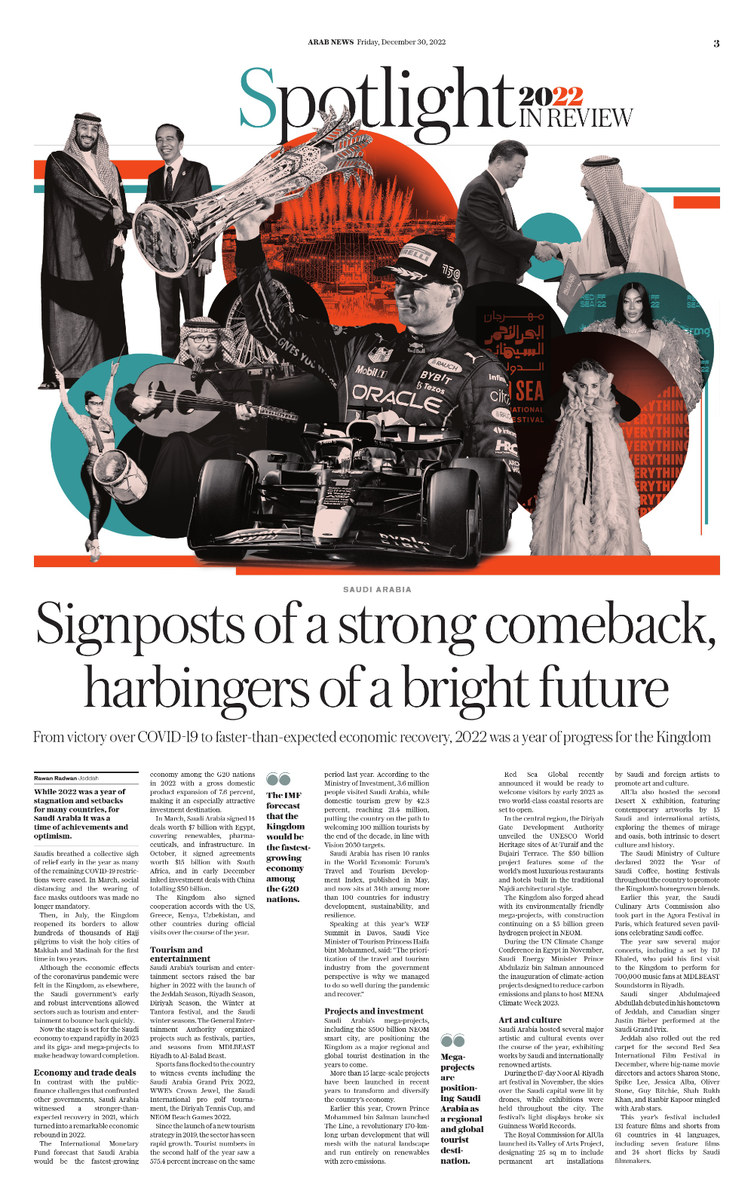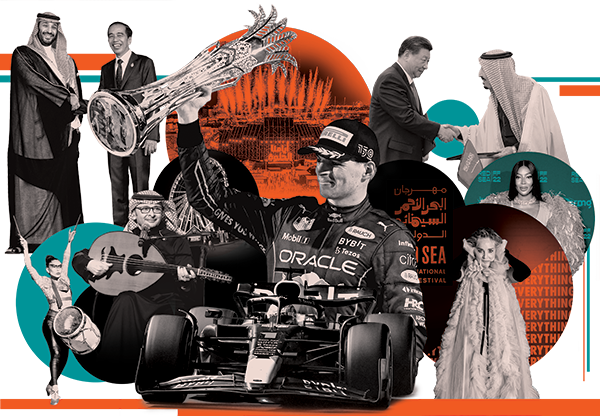JEDDAH: While 2022 was a year of stagnation and setbacks for many countries, for Saudi Arabia it was a time of achievements and optimism.
Saudis breathed a collective sigh of relief early in the year as many of the remaining COVID-19 restrictions were eased. In March, social distancing and the wearing of face masks outdoors was made no longer mandatory.
Then, in July, the Kingdom reopened its borders to allow hundreds of thousands of Hajj pilgrims to visit the holy cities of Makkah and Madinah for the first time in two years.
Although the economic effects of the coronavirus pandemic were felt in the Kingdom, as elsewhere, the Saudi government’s early and robust interventions allowed sectors such as tourism and entertainment to bounce back quickly.
Now the stage is set for the Saudi economy to expand rapidly in 2023 and its giga- and mega-projects to make headway toward completion.
Economy and trade deals
In contrast with the public-finance challenges that confronted other governments, Saudi Arabia witnessed a stronger-than-expected recovery in 2021, which turned into a remarkable economic rebound in 2022.
The International Monetary Fund forecast that Saudi Arabia would be the fastest-growing economy among the Group of Twenty nations in 2022 with a gross domestic product expansion of 7.6 percent, making it an especially attractive investment destination.
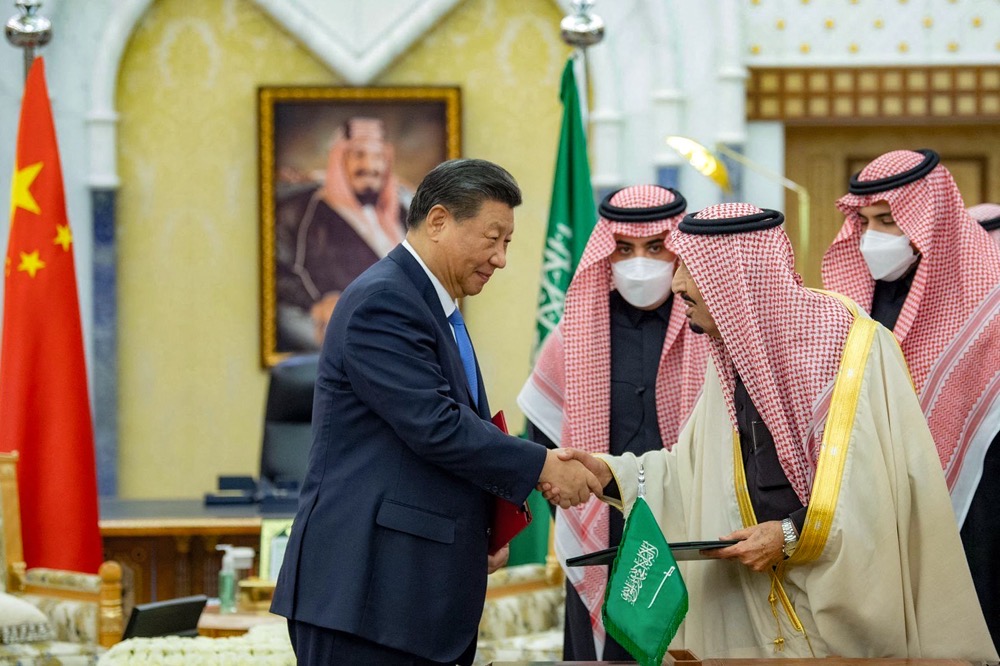
King Salman received China’s President Xi in December. (SPA)
In March, Saudi Arabia signed 14 deals worth $7 billion with Egypt, covering renewables, pharmaceuticals, and infrastructure. In October, it signed agreements worth $15 billion with South Africa, and in early December inked investment deals with China totalling $50 billion.
The Kingdom has also signed cooperation accords with the US, Greece, Kenya, Uzbekistan, and other countries during a series of official visits over the course of the year.
Tourism and entertainment
Saudi Arabia’s tourism and entertainment sectors raised the bar higher in 2022 with the launch of the Jeddah Season, Riyadh Season, Diriyah Season, the upcoming Winter at Tantora festival, and the Saudi winter seasons.
The General Entertainment Authority organized numerous tourism and entertainment projects, including festivals, parties, and seasons from MDLBEAST Riyadh to Al-Balad Beast.
Sports fans flocked to the country to witness events including the Saudi Arabia Grand Prix 2022, WWE’s Crown Jewel, the Saudi International pro golf tournament, the Diriyah Tennis Cup, and NEOM Beach Games 2022.
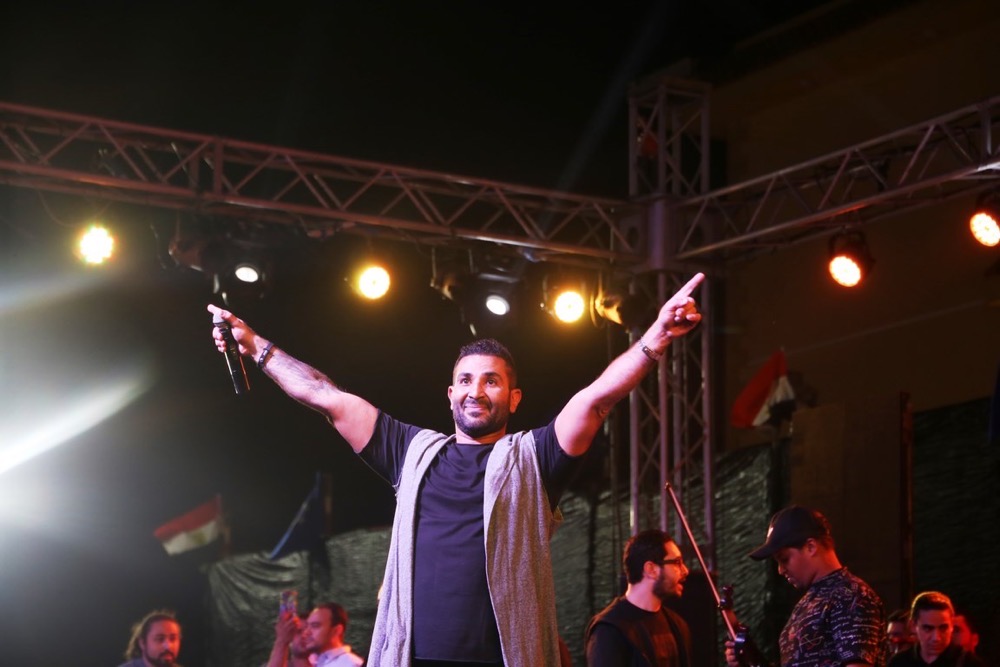
3.6 million people visited Saudi Arabia, while domestic tourism grew by 42.3 percent. (Supplied)
Since the launch of a new tourism strategy in 2019, the sector has seen rapid growth. Tourist numbers in the second half of the year saw a 575.4 percent increase on the same period last year.
According to the Ministry of Investment, 3.6 million people visited Saudi Arabia, while domestic tourism grew by 42.3 percent, reaching 21.4 million, putting the country on the path to welcoming 100 million tourists by the end of the decade, in line with Vision 2030 targets.
In fact, Saudi Arabia has risen 10 ranks in the World Economic Forum’s Travel and Tourism Development Index, published in May, and now sits at 34th among more than 100 countries for industry development, sustainability, and resilience.
Speaking at this year’s WEF Summit in Davos, Saudi Vice Minister of Tourism Princess Haifa bint Mohammed, said: “The prioritization of the travel and tourism industry from the government perspective is why we managed to do so well during the pandemic and recover.”
Projects and investment
Saudi Arabia’s mega-projects, including the $500 billion NEOM smart city, are positioning the Kingdom as a major regional and global tourist destination in the years to come.
More than 15 large-scale projects have been launched in recent years to transform and diversify the country’s economy.
Earlier this year, Crown Prince Mohammed bin Salman launched The Line, a revolutionary 170-kilometer-long urban development that will mesh with the natural landscape and run entirely on renewables with zero emissions.
Red Sea Global recently announced it would be ready to welcome visitors by early 2023 as two world-class coastal resorts are set to open.
In the central region, the Diriyah Gate Development Authority unveiled the UNESCO World Heritage sites of At-Turaif and the Bujairi Terrace. The $50 billion project features some of the world’s most luxurious restaurants and hotels built in the traditional Najdi architectural style.
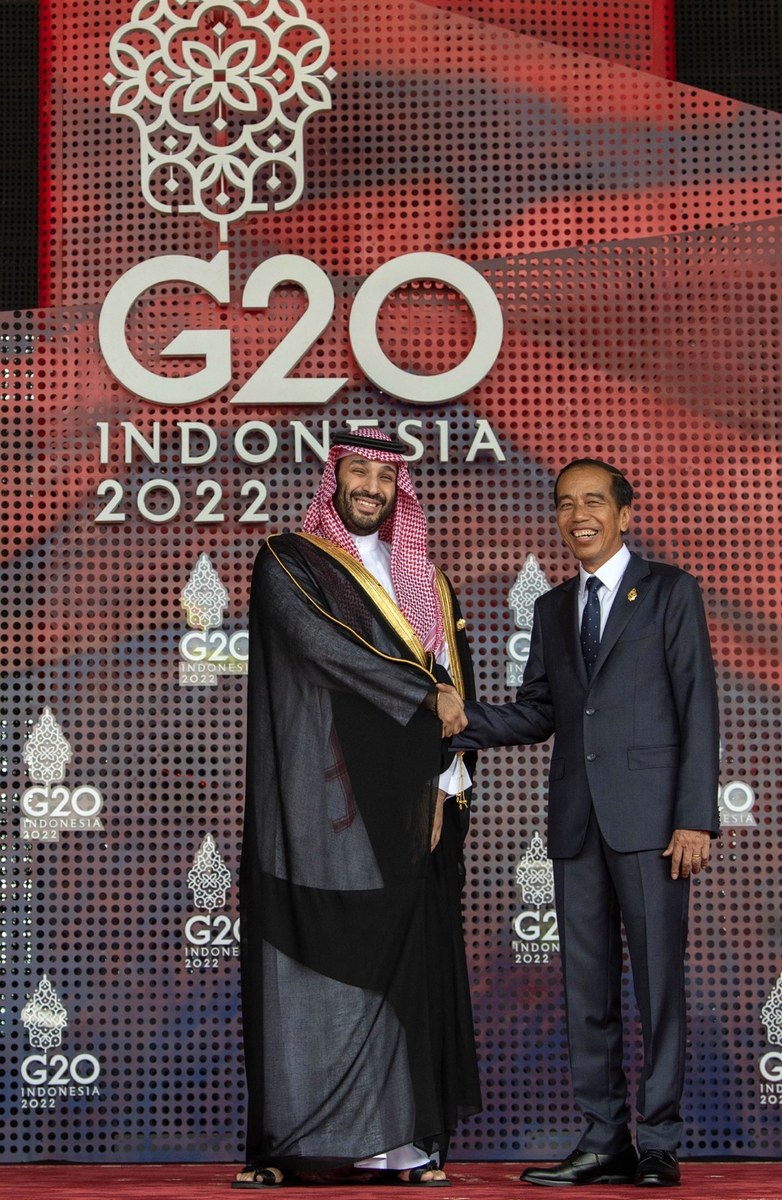
Crown Prince Mohammed bin Salman attended the G20 summit in Indonesia. (SPA)
The Kingdom also forged ahead with its environmentally friendly mega-projects, with construction continuing on a $5 billion green hydrogen project in NEOM.
During the UN Climate Change Conference (COP27), held in Egypt in November, Saudi Energy Minister Prince Abdulaziz bin Salman announced the inauguration of climate-action projects designed to reduce carbon emissions and plans to host MENA Climate Week 2023.
Art and culture
Saudi Arabia hosted several major artistic and cultural events over the course of the year, exhibiting works by Saudi and internationally renowned artists.
During the 17-day Noor Al-Riyadh art festival in November, the skies over the Saudi capital were lit by drones, while exhibitions were held throughout the city. The festival’s light displays broke six Guinness World Records.
Meanwhile, the Royal Commission for AlUla launched its Valley of Arts Project, designating 25 square miles to include permanent art installations by Saudi and foreign artists to promote art and culture in the region.
AlUla also hosted the second edition of the Desert X exhibition, featuring contemporary artworks by 15 Saudi and international artists, exploring the themes of mirage and oasis, both intrinsic to desert culture and history.
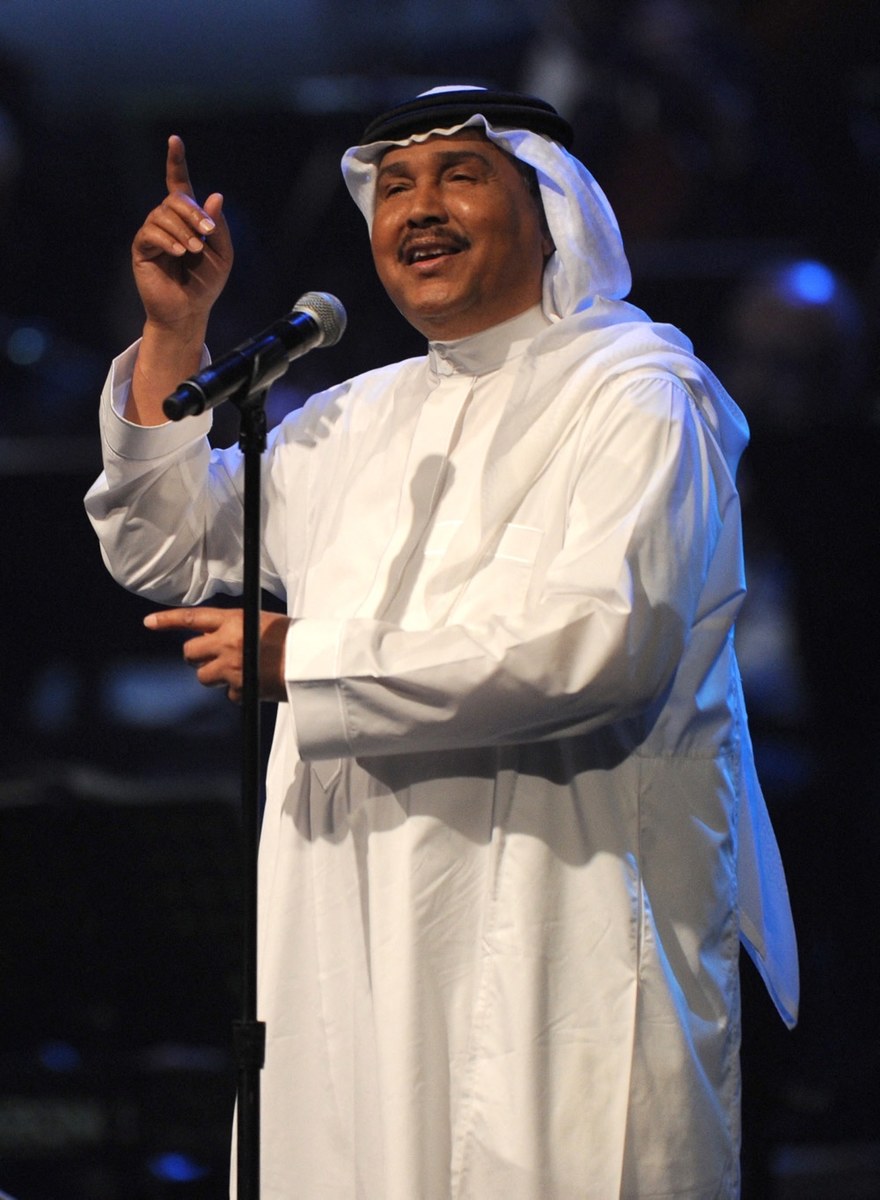
The year also saw several major concerts. (Supplied)
The Saudi Ministry of Culture declared 2022 the Year of Saudi Coffee, hosting festivals throughout the country to promote the Kingdom’s homegrown blends. Earlier this year, the Saudi Culinary Arts Commission also took part in the Agora Festival in Paris, which featured seven pavilions celebrating Saudi coffee.
The year also saw several major concerts, including a set by DJ Khaled, who paid his first visit to the Kingdom to perform for 700,000 music fans at MDLBEAST Soundstorm in Riyadh.
Saudi singer Abdulmajeed Abdullah also debuted in his hometown of Jeddah, and Canadian singer Justin Bieber performed at the Saudi Grand Prix.
Jeddah also rolled out the red carpet for the second edition of the Red Sea International Film Festival in December, where big-name movie directors and actors Sharon Stone, Spike Lee, Jessica Alba, Oliver Stone, Guy Ritchie, Shah Rukh Khan, and Ranbir Kapoor mingled with Arab stars.
This year’s festival included 131 feature films and shorts from 61 countries in 41 languages, including seven feature films and 24 short flicks by Saudi filmmakers.
